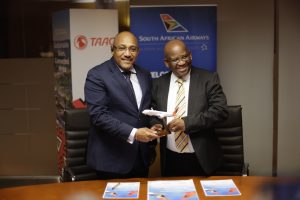The International Air Transport Association (IATA) called on Africa’s governments to take advantage of a strengthening aviation sector to maximize its benefits for economic and social development across the African Continent.
Recently IATA announced that Africa’s airlines are expected to earn a collective net profit in 2024 for the second year in a row. That is a welcome and hard-won result reflecting the sector’s resilience in its post-COVID recovery. The expected $100 million profit, however, translates into just 90 cents per passenger—well below the global average of $6.14.
“Africa’s airlines are making a collective profit. That is good news. But it is razor-thin and well below the global benchmark. And there are wide variations across the continent where many individual airlines still struggle with losses. The demand to travel is there. To meet it, the African airline sector needs to overcome many challenges, not least of which are infrastructure deficiencies, high costs, onerous taxation, and the failure to broadly implement a continent-wide multilateral traffic rights regime,” said Kamil Alawadhi, IATA’s Regional Vice President for Africa and the Middle East.
“The challenges facing African aviation are significant, but they are not insurmountable. IATA’s Focus Africa initiative is by no means a panacea, but it does lay out a framework to build a stronger aviation sector that will provide even better support to economic growth and social development. The prize for working together across the continent for safe, efficient, and sustainable air connectivity is well worth focused policy efforts across the continent,” said Alawadhi.
2024 Financial Outlook Highlights
▪ Net Post-Tax Profit: African airlines are projected to achieve a net post-tax profit of $100 million, the second year of profits following the COVID crisis.
▪ Per Passenger Profit: Profit per passenger is expected to reach USD 0.9, nearly doubling the 2023 figure of $0.5, reflecting improved operational efficiency and increased demand, but well behind the global average of $6.14.
▪ Profit as a Percentage of Revenue: Profit margins are anticipated to be 0.6% of revenue, up from 0.4% in 2023. This remains significantly lower than the global net profit margin of 3.1%.
▪ Revenue Passenger Kilometers (RPK) Growth: RPK growth is forecasted at 8.5%, indicating continued strong passenger demand across the region. This does, however, lag behind the expected growth in capacity of 9.1%.
▪ Load Factor: The load factor is expected to reach 61.9%, slightly ahead of the 59.8% breakeven load factor for African Airlines.
Focus Africa Priorities
Focus Africa aims to address key challenges and opportunities within the continent’s aviation sector. The initiative emphasizes six priority areas: Safety, Infrastructure, Connectivity, Finance and Distribution, Sustainability, and Future Skills.
▪ Safety
Africa had no jet hull losses in 2023, for the second year in a row. Moreover, the continent recorded no fatalities in commercial aviation accidents in 2023, as presented within the IATA Annual Safety Report. The all accident rate for Africa was 6.38 per million sectors which is an improvement on the five-year average of 7.11.
IOSA registered carriers continue to outperform non-IOSA registered carriers both on the continent and globally. There are currently 31 operators in Africa on the IOSA registry.
The priority for Africa continues to be the implementation of safety-critical ICAO Standards and Recommended Practices (SARPS) for safety. Under the Focus Africa initiative IATA introduced the Collaborative Aviation Safety Improvement Program (CASIP) to help deliver this.
The Global Aviation Safety Plan (GASP) and the AFI Regional Aviation Safety Plan are targeting SARPS implementation at 75% for Africa. Currently, only 12 out of Africa’s 54 states meet this standard.
▪ Connectivity
The Single African Air Transport Market (SAATM) seeks to liberalize civil aviation across the continent by removing restrictions on traffic rights for African airlines. SAATM provides Africa with a ready-made mechanism to drive economic growth, but few governments have taken the steps needed for its implementation. Moreover, an IATA analysis of 607 bilateral air service agreements (BASA’s) in Africa revealed limitations on the development of intra-Africa connectivity because the implementation of over half of these agreements was being compromised.
Non-compliance of by African governments BASA’s is a major obstacle to achieving seamless regional connectivity and growth in the African aviation sector. To develop economy-boosting intra-Africa connectivity Africa’s governments must back SAATM with actions. This is another key element Focus Africa is addressing.
▪ Blocked Funds
The development of connectivity in Africa also requires certainty that markets will abide by global standards with respect to the repatriation of funds from sales activities. Airlines still struggle with the inability to repatriate blocked funds efficiently and in line with international agreements and treaty obligations in several African markets.
The amount of blocked funds in African countries in June 2024 stood at $880 million, just over 52% of the $1.68 billion in blocked funds globally. This is an improvement following Nigeria clearing 98% of the total funds blocked ($831 million).The top five countries in Africa with blocked funds are:
__________________________________
Country Amount Blocked ($millions)
__________________________________
Algeria 261
XAF Zone 140
Ethiopia 115
Eritrea 75
Zimbabwe 69
“The potential for aviation in Africa is huge. It has 17% of the world’s population yet only contributes about 2% of total global travel. While there are hurdles to overcome, through collaborative initiatives like Focus Africa with our partners including AFCAC, AFRAA and AASA we are addressing critical challenges hindering the advancement of aviation across Africa. Our goal is a safer, more efficient, and better-connected continent, driven by a diverse, skilled workforce to unleash aviation’s potential and unlock the economic and social opportunities,” said Al Awadhi.







